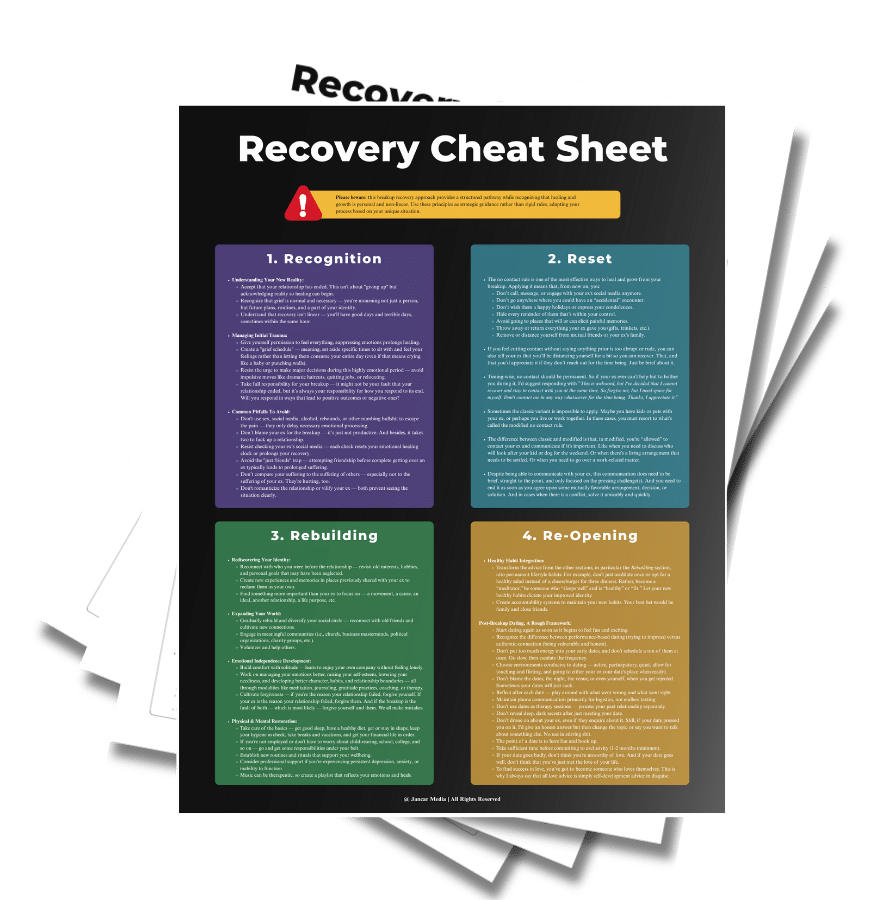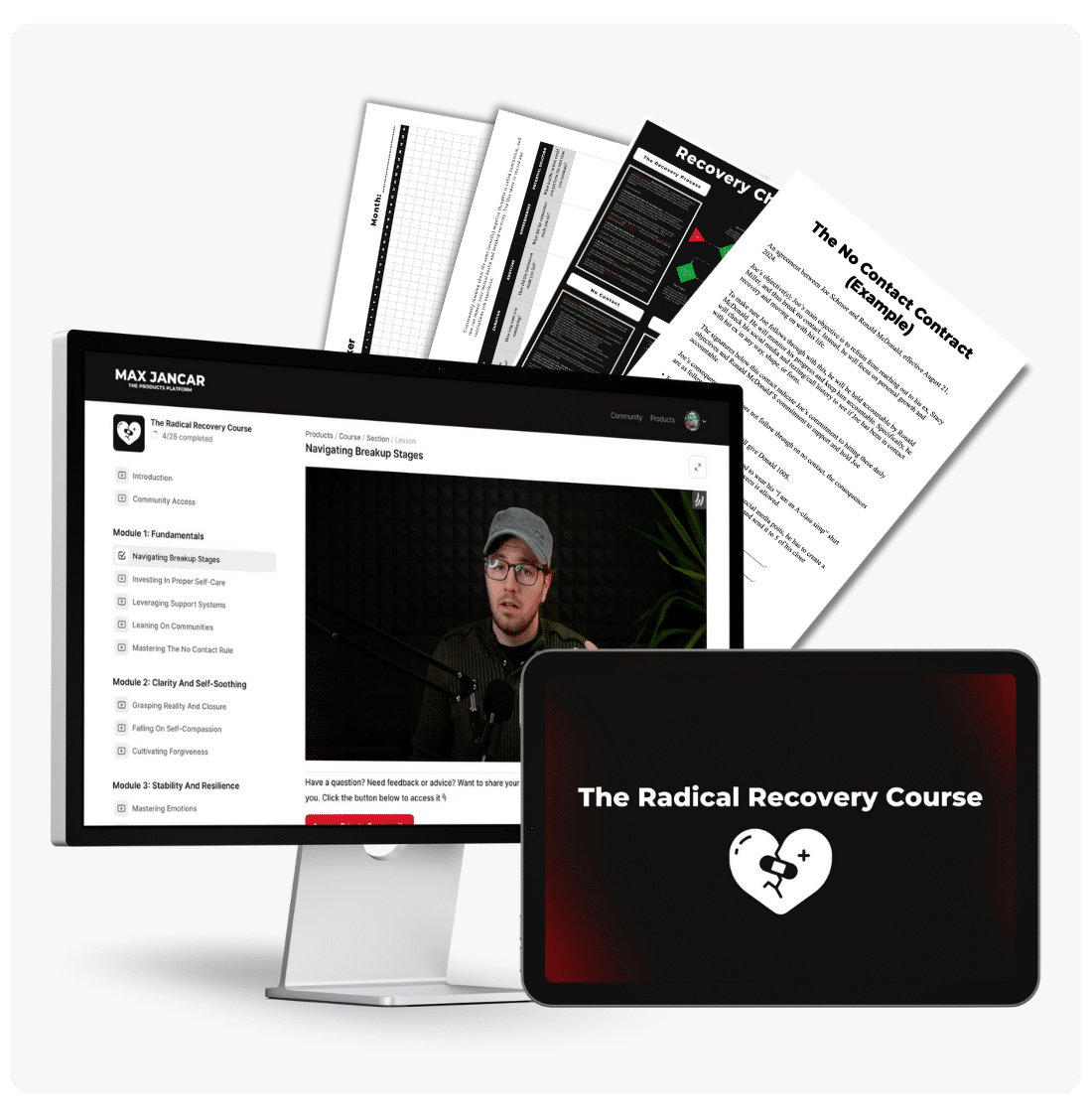Click play to listen to this article.
Once we move past the initial post-breakup lull, often lasting 3-8 weeks, there typically comes a period of immense self-improvement. During this period we work on rebuilding our self-esteem, resolving our insecurities, learning valuable relationship skills, and so on.
However, many people face an interesting paradox during this time: their self-improvement efforts end up becoming self-defeating. In other words, the more they strive to improve themselves, the worse they feel.
This is The Self-Improvement Paradox. And here’s what it looks like in progress.
We try to air out all our emotional baggage. We attempt to strip ourselves of all insecurities and trauma. We strive to become the smartest, healthiest, fittest, richest, most magnetic version of ourselves.
All of these are noble pursuits.
It’s a shame, however, that they all lead to pain and disappointment. Because through obsessively chasing after them, we’re concurrently pursuing an unattainable ideal: perfection.
Now perfection — she’s one elusive motherfucker. As soon as we get close, the bitch slips away. As a result, the harder we chase perfection, the more inadequate and lousy we feel.
And if we keep chasing after her, guess what: we board a neverending cycle of disappointment, each rotation leading us further down a self-created pit of misery.
At least, that’s the case with most of the people I talked to about this stuff.
So if obsessive and practically endless self-improvement is off the table, what should we do instead? What should we do instead of chasing perfection? More importantly, what should you do specifically?”
Simple.
Once you sense you’ve handled the more prominent issues plaguing you and holding you back in the areas of life important to you, focus on cultivating self-acceptance rather than furthering self-improvement. In other words, instead of perfecting yourself, let some of your imperfections stay unresolved — and be at peace with it.
Because the truth is, you will never overcome all your emotional baggage. You will never resolve all your insecurities and trauma. You will never become your ideal version.
Sure, strive toward all that — ambition is great, after all. It means that even if you don’t hit all of your self-improvement goals, the fact that you tried will bring you much closer to them than if you didn’t try at all.
All I am saying is that while you should strive toward perfection, you shouldn’t expect yourself to reach it. Because realistically, you can’t — none of us can. That beautiful, perfect vision you have in your head of how things should be is a fairytale — always has been.
And that’s perfect.
Because knowing this, you can step off the neverending wheel of self-improvement and taste the freedom and peace that comes with self-acceptance. Besides, as paradoxical as it sounds, sometimes the best way to improve at something is to stop trying to improve at it.
Another positive aspect of self-acceptance is that it saves you hours of unbearable and unproductive navel-gazing that so often precedes the actionable parts of self-improvement.
Navel-gazing such as thinking whether you’re always late because you’re secretly rebelling against authority or because you’re just perpetually disorganized. Or thinking whether you avoid commitment because your first love broke your heart or because you’re just scared of growing the fuck up?
That being said, not everything about self-acceptance is roses and unicorns.
Sometimes people use it to avoid the problems in their life and along their breakup recovery journey. And that’s when we talk about toxic self-acceptance.
Obviously, you want to fend off this version of self-acceptance. So stay vigilant about why you’re okay with certain aspects of yourself and whether or not your motives are justified.
For instance, are you being self-accepting to avoid dealing with other problems and imperfections you should actually address and resolve? Then self-acceptance is probably not what you should be cultivating — at least momentarily.
On the other hand, if you’re cultivating it because you’ve genuinely improved enough and any further self-improvement would only lead to minimal or even diminishing returns, then you’re probably in the right by cultivating self-acceptance.
Overall, the key to healthy self-acceptance is balance.
But everyone’s balance is somewhat different. Because all our personal problems and flaws and imperfections are somewhat different. This means I can’t really give a blanket answer. You’ll just have to find your specific answer for yourself. So go and do that.
What worked for me was following a simple Buddhist saying: “You are perfect as you are, but there is always room for improvement.” Translation: while you should strive for growth, you should also accept who you are in the moment, warts and all.
This cheat sheet lays out 40+ solutions to overcoming a breakup so you can create a new opportunity for love — be that with your ex or someone completely different.
Get The Free Cheat Sheet


